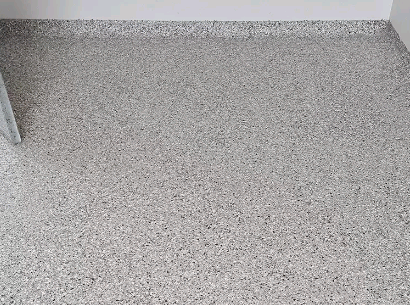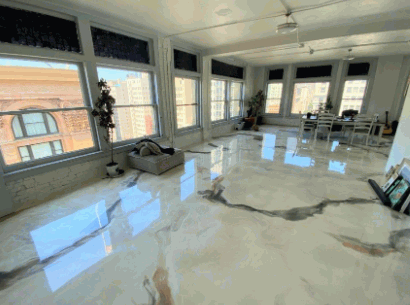Are you looking to upgrade your flooring, but are concerned about the cost? Resin flooring may be the solution you’ve been searching for. In this article, we will explore the cost of resin flooring and how it compares to other flooring options. Don’t miss out on this budget-friendly flooring option.

What Is Resin Flooring?
Resin flooring is a popular type of flooring system that combines resin, hardeners, and fillers to create a seamless and durable surface. This type of flooring is highly resistant to chemicals and easy to maintain, making it a common choice for industrial, commercial, and residential spaces. Interestingly, with proper maintenance, resin flooring can last for over 20 years, making it a cost-effective long-term solution for various applications.

What Are The Types Of Resin Flooring?
Resin flooring is a popular choice for both residential and commercial spaces due to its durability and versatility. However, many people are unaware that there are different types of resin flooring available. In this section, we will discuss the three main types of resin flooring: epoxy, polyurethane, and methyl methacrylate (MMA). Each type has its own unique characteristics and applications, making it important to understand the differences between them before deciding on the best option for your space.
1. Epoxy Resin Flooring
- Prepare the floor: Ensure the surface is clean, dry, and free of dust or debris.
- Prime the surface: Apply an epoxy primer to promote adhesion between the substrate and the epoxy resin flooring system.
- Mix and apply the epoxy resin: Follow the manufacturer’s instructions for mixing and apply the resin evenly.
- Allow curing time: Let the epoxy cure according to the specified time for optimal performance.
- Apply a topcoat: For enhanced durability and protection, apply a topcoat over the cured epoxy resin layer.
Did you know? Epoxy resin flooring offers seamless and non-porous surfaces, making it ideal for areas requiring high hygiene standards.

2. Polyurethane Resin Flooring
- Polyurethane resin flooring is a versatile option suitable for various environments such as industrial, commercial, and residential spaces.
- It provides excellent chemical and abrasion resistance, making it an ideal choice for areas with heavy foot traffic and potential spills.
- The installation process includes thorough surface preparation, followed by the application of the polyurethane resin system, which cures quickly, reducing downtime.

3. Methyl Methacrylate Resin Flooring
- Highly durable: Methyl Methacrylate (MMA) resin flooring is renowned for its exceptional durability, making it highly suitable for high-traffic areas.
- Rapid curing time: This type of flooring cures quickly, minimizing downtime during installation and allowing for a faster return to service.
- Chemical resistance: MMA resin flooring offers excellent resistance to a variety of chemicals, making it an ideal choice for industrial and commercial settings.
- Temperature tolerance: It is capable of withstanding extreme temperatures, ensuring its suitability for both indoor and outdoor applications.

Is Resin Flooring Expensive?
When considering a new flooring option, cost is often a major factor in the decision-making process. In this section, we will discuss the question on everyone’s mind: is resin flooring expensive? We will break down the cost factors of resin flooring, including materials, installation, and maintenance. Furthermore, we will compare the cost of resin flooring to other popular flooring options, providing a comprehensive understanding of its affordability in the market.

1. Cost Factors of Resin Flooring
- Material Costs: When considering the cost factors of resin flooring, it’s important to take into account the cost of the resin material itself. This cost can vary depending on the type of resin flooring chosen – epoxy, polyurethane, or methyl methacrylate.
- Labor Costs: It’s also important to assess the expenses involved in hiring professionals for the installation, and make sure it aligns with your budget.
- Preparation Costs: Another cost factor to consider is the preparation process, including surface preparation, repairs, and priming, as this can impact the overall cost of the project.
- Maintenance Costs: Don’t forget to factor in long-term maintenance expenditures, such as periodic resealing or repairs, when calculating the total cost of resin flooring.
2. Comparison With Other Flooring Options
| Aspect | Resin Flooring | Laminate Flooring | Tile Flooring |
| Installation Time | Long | Short | Medium |
| Durability | High | Medium | High |
| Maintenance | Easy | Moderate | Moderate |
What Are The Benefits Of Resin Flooring?
Resin flooring has become a popular choice for both residential and commercial spaces, but is it worth the investment? Before we answer that question, let’s take a closer look at the benefits of resin flooring. From its durability and low maintenance to its chemical and stain resistance, resin flooring offers a range of advantages. Additionally, we’ll explore its aesthetic appeal and safety features, making a strong case for why resin flooring is a smart choice for any space.

1. Durability
- Evaluate the expected foot traffic and potential impact on the flooring to gauge its durability.
- Consider the specific type of resin flooring (epoxy, polyurethane, or methyl methacrylate) and determine its suitability for your durability requirements.
- Assess the warranty and lifespan offered by different resin flooring options to ensure long-term durability.
2. Easy Maintenance
- Regular Cleaning: Sweep or vacuum the floor regularly to remove dirt and debris.
- Use Mild Cleaning Agents: Clean the floor with mild detergents to avoid damaging the resin coating.
- Prevent Scratches: Place felt pads under furniture legs to prevent scratching the resin surface.
- Immediate Spill Cleanup: Wipe up spills promptly to prevent staining or damage to the flooring.
- Professional Maintenance: Schedule periodic professional cleaning and maintenance to ensure easy maintenance and preserve the flooring’s quality.
3. Chemical And Stain Resistance
- Choose the right type: Epoxy resin offers exceptional chemical and stain resistance thanks to its non-porous nature.
- Surface preparation: Make sure the substrate is thoroughly cleaned and free from contaminants to achieve optimal adhesion.
- Application technique: Properly applying the resin flooring system is crucial in achieving the desired level of chemical and stain resistance.
4. Aesthetics
Aesthetics are an essential factor to consider when choosing resin flooring. The smooth and shiny finish of epoxy resin flooring adds to the overall visual appeal of any room. Polyurethane resin flooring offers a vast selection of colors and designs to enhance the atmosphere. For a more modern and sleek look, methyl methacrylate resin flooring is the perfect choice for contemporary settings.
5. Safety
- Ensure proper surface preparation to avoid any uneven areas or bumps.
- Use anti-slip additives to enhance traction and reduce slipperiness when wet.
- Regularly inspect and maintain the flooring to address any potential safety hazards promptly.
The importance of safety in flooring can be traced back to ancient civilizations, where various techniques were used to create non-slip surfaces for the safety of those living and working in the space.
What Are The Drawbacks Of Resin Flooring?
While resin flooring may have many benefits, it is important to also consider the potential drawbacks of this type of flooring. In this section, we will discuss the main drawbacks of resin flooring, including its initial cost, installation time, and potential slipperiness when wet. By understanding these potential downsides, you can make an informed decision about whether resin flooring is the right choice for your space.
1. Initial Cost
- Evaluate the initial cost of resin flooring by obtaining quotes from various suppliers.
- Consider the long-term benefits and cost savings associated with the durability and low maintenance of resin flooring.
- Assess the value of the investment by comparing it to other flooring options.
2. Installation Time
Preparation: Clear the area where the resin flooring will be installed, ensuring it’s clean, dry, and free from debris.
Priming: Apply a primer to the prepared surface to promote adhesion.
Application: Pour the resin mixture onto the prepared surface and spread it evenly using appropriate tools.
Curing: Allow the resin to cure for the specified time, considering the importance of installation time, it’s best to consult professionals for accurate time estimates and proper execution. During this period, it’s important to avoid foot traffic or placing heavy objects on the surface.
By following these steps, you can ensure a successful and durable resin flooring installation.
3. Slipperiness When Wet
- Choose non-slip additives: Incorporate materials like aluminum oxide or silicon carbide into the resin to enhance traction.
- Regular cleaning: Implement routine cleaning and maintenance to keep the floor free from contaminants that could contribute to slipperiness when wet.
- Implement anti-slip coatings: Apply specialized coatings designed to reduce the risk of slipperiness, particularly when the floor is wet.
How To Determine If Resin Flooring Is Right For You?
Are you considering resin flooring for your home or business, but unsure if it’s the right choice for you? In this section, we will discuss the key factors to consider when determining if resin flooring is a suitable option for your space. From budget considerations to understanding your specific needs and consulting with a professional, we’ll cover all the necessary steps to help you make an informed decision. So, let’s dive in and find out if resin flooring is the right fit for you.
Discover: Is Resin Flooring Suitable For Bathrooms
1. Consider Your Budget
- Assess the total budget for flooring projects, including material, labor, and any additional costs.
- Research the cost variance in resin flooring based on type, thickness, and customization.
- Consider long-term savings due to resin flooring’s durability and low maintenance requirements.
Fact: Resin flooring can last up to 10 years with minimal maintenance, making it a cost-effective option in the long run.
2. Assess Your Needs And Requirements
- Evaluate the specific area where you plan to install the resin flooring, considering factors such as foot traffic, potential impact, and exposure to chemicals.
- Assess your needs and requirements, including the required level of durability and maintenance, and align it with your usage patterns and long-term expectations.
- Consider the aesthetics, choosing the resin flooring type that complements the visual appeal you aim to achieve for the space.
- Review safety requirements, especially in areas prone to spills or moisture, to ensure the selected resin flooring offers the necessary slip resistance.
Fact: Resin flooring can last up to 10 years without requiring major maintenance, making it a durable and cost-effective choice for commercial and industrial spaces.
3. Consult With A Professional
- Research: Look for reputable professionals with experience in diverse projects, particularly in the field of resin flooring.
- Ask for Recommendations: Seek referrals from friends, colleagues, or industry experts to find reliable professionals who specialize in resin flooring.
- Interview: Schedule consultations with potential professionals to discuss your specific needs, assess their expertise in resin flooring, and evaluate their communication skills.
- Check Qualifications: Verify the professional’s certifications, licenses, and insurance to ensure they meet industry standards for resin flooring.
- Request Quotations: Obtain detailed quotes from multiple professionals who specialize in resin flooring to compare costs, services, and timelines.







